Gain Your Audience’s Attention
Begin your speech with an attention-
How do you craft an effective attention-

Tell a Story or an Anecdote. Most people love a good story, so opening with one can be a compelling yet comfortable way to begin your speech. If you start your speech with a story, be sure it relates to your message, takes up an appropriate amount of time, and comes across as believable. Avoid making up a story to open your speech unless you note that you are offering a hypothetical example.
Here is how one student used an anecdote to begin a speech about reforming the No Child Left Behind education law:
The May 2, 2005, issue of Time magazine reported that in the Utah War of 1857 to 1858, President James Buchanan sent thousands of federal troops into the territory to install a non-
Page 282
Notice how the anecdote about Utah in the 1850s grabs the audience’s attention by relating a dramatic historical incident in vivid language and startling detail. The story also relates to the speech’s topic because in both cases, the state of Utah rebels against a federal mandate.

Offer a Striking or Provocative Statement. A compelling fact or idea pertaining to your topic can immediately pull the audience into your speech. For example, you might present a surprising statistic or make an ironic statement to defy your listeners’ expectations about what they’ll hear during your speech. This approach works only if you present a fact or an idea that’s new, ironic, or counterintuitive to your audience. You also are likely to be more effective if you incorporate dynamic language into your striking or provocative statement.
Consider Václav Havel, a playwright and dissident who became the first popularly elected president of Czechoslovakia in more than forty years. From 1948 until 1989, Czechoslovakia was under the rule of corrupt, authoritarian Communist leaders, and after the Soviet Union and its allies invaded the country in 1968, Havel’s works were banned. He was arrested many times in the 1970s and 1980s and was a leader of the 1989 nonviolent Velvet Revolution. On January 1, 1990, in his first presidential address to the Czech people, Havel offered a striking statement that differentiated him from his unelected predecessors, who had controlled the Czech media and propagandized the government’s achievements:
Page 283
My dear fellow citizens, for forty years on this day you heard from my predecessors the same thing in a number of variations: how our country is flourishing, how many millions of tons of steel we produce, how happy we all are, how we trust our government, and what bright prospects lie ahead of us. I assume you did not propose me for this office so that I, too, should lie to you.3
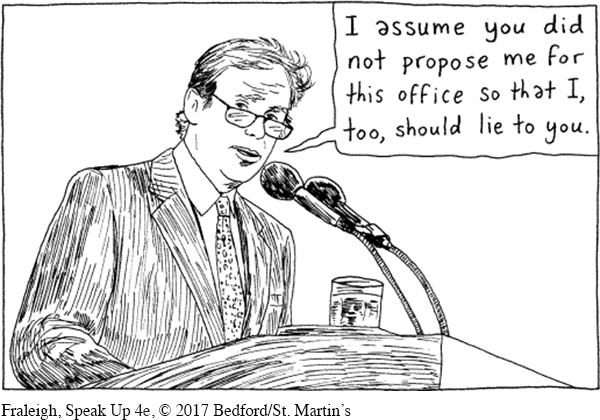
Build Suspense. Consider increasing audience curiosity and anticipation before you reveal your topic. For example, “What will be one of the biggest problems in the next ten years?” or “One of the most exotic vacation spots in the world is unknown to 98 percent of American tourists.” Here’s how one student built curiosity in the introduction of his speech:
There is a growing problem on our campus. Affected students find it difficult to wake up and get to class. They may experience threats to their academic performance, physical health, and mental health, too. The problem is bingeing. I’m not referring to binge eating or drinking, although these are serious problems. If you’ve ever stayed up all night watching Game of Thrones, The Walking Dead, or Orange Is the New Black, you know what I am talking about.
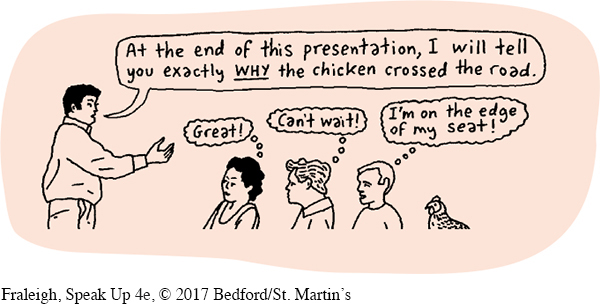
Page 284
This student then proceeded to document the risks of excessive binge watching and offered tips for controlling the time students spend viewing their favorite shows.
Let Listeners Know You’re One of Them. Consider highlighting similarities or shared interests between you and the audience. When listeners believe that a speaker is like them, they tend to see him or her as more credible—
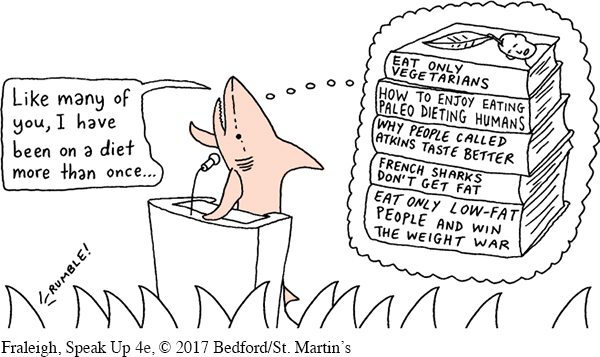
Here’s how one student highlighted common ground in a speech about the resources available on the U.S. Department of Agriculture’s ChooseMyPlate Web site:
When I surveyed our class, I discovered that over 70 percent of you agreed with this statement: “I try to eat a healthy diet.” Like many of you, I have been on a diet more than once, and I do my best to eat my fruits and vegetables. I would like to share one of the best resources that I have found—
Page 285
Use Humor. Most people enjoy jokes, amusing stories, or other humorous references. A funny or playful attention-
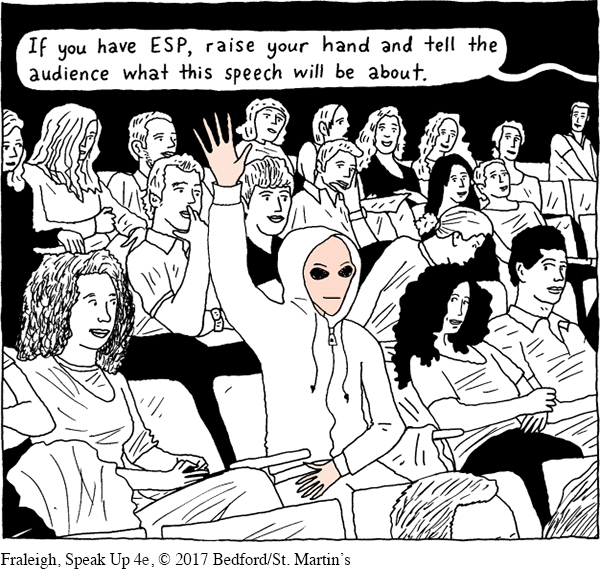
Also note that using humor as your attention-
If you have ESP, raise your hand, and tell the audience what this speech will be about.
Page 286
If you have trouble telling jokes or remembering punch lines, you may find that a relevant anecdote from your own life is a better source of humor. At one time or another, most people have told a funny story about something that has happened to them. This more personal approach may help you feel more relaxed and conversational.
Ask a Rhetorical Question. A rhetorical question—one that you want listeners to answer in their heads—
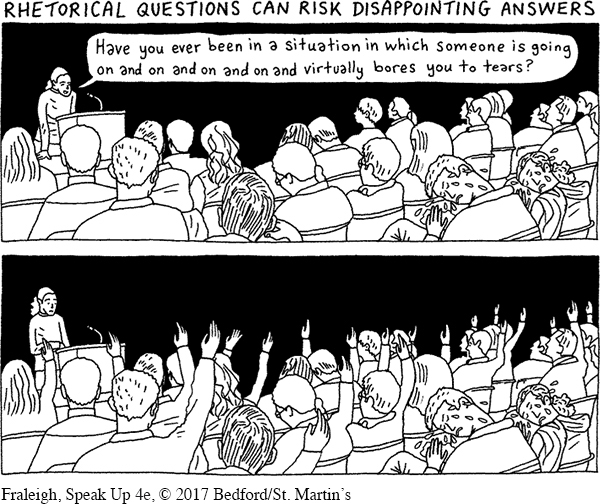
Page 287
Here is how a speaker could use a rhetorical question to gain audience attention in a speech about digilantism,5 or vigilante behaviors on the Internet:
Imagine that a photo of the back of your car (showing the license plate number, your bumper stickers, and a rather large dent) driving past a visible street sign appeared on a social media forum in your community. Below it was this caption—
Provide a Quotation. A stimulating quotation that illuminates your topic can make an effective attention-

Page 288
You also can quote an expert in the field as an attention-
According to Dr. LeAnne Forquer and her colleagues in the Central Michigan University psychology department, “Adolescents and young adults, including college students, appear to be one of the most sleep-
To see an example of an attention-